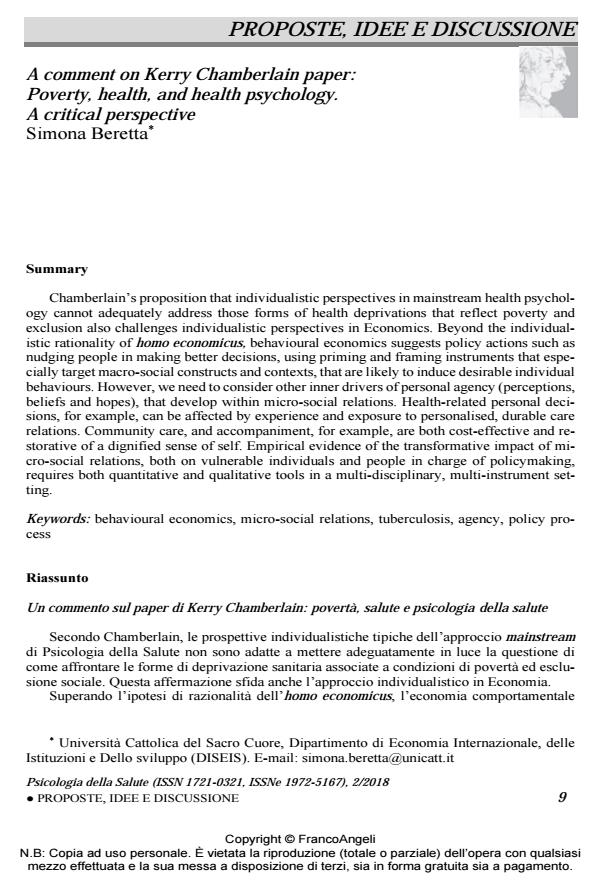A comment on Kerry Chamberlain paper: Poverty, health, and health psychology. A critical perspective
Titolo Rivista PSICOLOGIA DELLA SALUTE
Autori/Curatori Simona Beretta
Anno di pubblicazione 2018 Fascicolo 2018/2 Lingua Inglese
Numero pagine 8 P. 9-16 Dimensione file 175 KB
DOI 10.3280/PDS2018-002003
Il DOI è il codice a barre della proprietà intellettuale: per saperne di più
clicca qui
Qui sotto puoi vedere in anteprima la prima pagina di questo articolo.
Se questo articolo ti interessa, lo puoi acquistare (e scaricare in formato pdf) seguendo le facili indicazioni per acquistare il download credit. Acquista Download Credits per scaricare questo Articolo in formato PDF

FrancoAngeli è membro della Publishers International Linking Association, Inc (PILA)associazione indipendente e non profit per facilitare (attraverso i servizi tecnologici implementati da CrossRef.org) l’accesso degli studiosi ai contenuti digitali nelle pubblicazioni professionali e scientifiche
Chamberlain’s proposition that individualistic perspectives in mainstream health psychology cannot adequately address those forms of health deprivations that reflect poverty and exclusion also challenges individualistic perspectives in Economics. Beyond the individualistic rationality of homo economicus, behavioural economics suggests policy actions such as nudging people in making better decisions, using priming and framing instruments that especially target macro-social constructs and contexts, that are likely to induce desirable individual behaviours. However, we need to consider other inner drivers of personal agency (perceptions, beliefs and hopes), that develop within micro-social relations. Health-related personal decisions, for example, can be affected by experience and exposure to personalised, durable care relations. Community care, and accompaniment, for example, are both cost-effective and restorative of a dignified sense of self. Empirical evidence of the transformative impact of micro- social relations, both on vulnerable individuals and people in charge of policymaking, requires both quantitative and qualitative tools in a multi-disciplinary, multi-instrument setting.
Secondo Chamberlain, le prospettive individualistiche tipiche dell’approccio mainstream di Psicologia della Salute non sono adatte a mettere adeguatamente in luce la questione di come affrontare le forme di deprivazione sanitaria associate a condizioni di povertà ed esclusione sociale. Questa affermazione sfida anche l’approccio individualistico in Economia. Superando l’ipotesi di razionalità dell’homo economicus, l’economia comportamentale suggerisce politiche di nudging per spingere individui non perfettamente razionali verso scelte migliori, utilizzando forme di priming e di framing che riformulino i costrutti e contesti macro- sociali in cui le scelte individuali avvengono, inducendo comportamenti maggiormente desiderabili. Tuttavia, l’agire individuale risponde ad altre determinanti profonde (percezioni, convinzioni, speranze) che si sviluppano nelle relazioni micro-sociali. Le decisioni personali relative alla salute, per esempio, dipendono anche dalla esposizione ed esperienza di relazioni personalizzate e durevoli di cura. La community care e l’accompagnamento, per esempio, sono forme di intervento efficaci sia in termini di costo, sia nel rigenerare il senso di dignità personale. L’analisi empirica del possibile impatto trasformativo delle relazioni micro-sociali, sia sui soggetti vulnerabili sia sui decisori della politica sanitaria, richiede approcci multidisciplinari e multi-strumenti, con l’uso di metodi sia qualitativi, sia quantitativi.
Keywords:Economia comportamentale, relazioni micro sociali, tubercolosi, agency, processo politico
- Akerlof G.A. and Kranton R.E. (2000). Economics and Identity. Quarterly Journal of Economics CXV (3): 715-753. DOI: 10.1162/00335530055488
- Akerlof G.A. and Kranton R.E. (2010). Identity Economics: How Identities Shape Our Work, Wages, and Well-Being. Princeton: Princeton University Press.
- Alkire S. (2007) The Missing Dimensions of Poverty Data: Introduction to the Special Issue. Oxford Development Studies, 35, 4: 347-359. DOI: 10.1080/1360081070170186
- Balestri S. (2018), Inside the Policy Process: using textual analysis to measure people-centered approach in tuberculosis policymaking, Global Health Research and Policy, forthcoming.
- Beretta S. and Maggioni M.A. (2017), Time, Relations and Behaviors: Measuring the Transformative Power of Love-Based Community Life. Kellogg Institute for International Studies, Working Paper #421 – May 2017, https://kellogg.nd.edu/sites/default/files/working_papers/421.pdf
- Citro B., Lyon E., Mankad M., Pandey K.R. and Gianella C. (2016), Developing a Human Rights-Based Approach to Tuberculosis. Health and Human Rights. Jun; 18(1): 1-8. https://cdn2.sph.harvard.edu/wp-content/uploads/sites/125/2016/06/Editorial_final.pdf
- Farmer P., Léandre F., Mukherjee J.S., Claude M.S., Nevil P., Smith-Fawzi M.C. and Kim J.Y. (2001). Community-based approaches to HIV treatment in resource-poor settings. The Lancet, 358 (9279): 404-409. DOI: 10.1016/S0140-6736(01)05550-
- Farmer P. (2011). Partners in Help. Assisting the Poor over the Long Term. Foreign Affairs, July 29, https://www.foreignaffairs.com/articles/haiti/2011-07-29/partners-help
- Lybbert T.J. and Wydick B. (2016). Hope as Aspirations, Agency, and Pathways: Poverty Dynamics and Microfinance in Oaxaca, Mexico, NBER Working Paper No. 22661, September 2016, http://www.nber.org/papers/w22661
- Maggioni M.A., Rossignoli D., Beretta S. and Balestri S. (2018). Trust behind bars: Measuring change in inmates’ prosocial preferences. Journal of Economic Psychology, 64: 89-104.
- Schmeidler D. and Gilboa I. (2001). A Theory of Case-Based Decisions. Cambridge, Cambridge University Press.
- Tarde G. (de) (1902). Psychologie économique (Vol. 2). Paris: Félix Alcan, Éditeur, pp. 383, http://classiques.uqac.ca/classiques/tarde_gabriel/psycho_economique_t1/psycho_eco_t1.html
- Thaler R.H. and Sunstein C.R. (2008). Nudge: Improving Decisions About Health, Wealth, and Happiness, New Haven; London: Yale University Press.
- World Bank (2015). World Development Report 2015: Mind, Society, and Behavior. Washington, DC: World Bank.
- World Health Organization (2002). Community Home-Based Care in Resource-Limited Settings, A Framework For Action, Published Collaboratively by the Cross Cluster Initiative On Home-Based Long-Term Care, Non-Communicable Diseases And Mental Health and the Department of HIV/AIDS, Family and Community Health. World Health Organization, Geneva, -- http://www.who.int/chp/knowledge/publications/comm_home_based_care.pdf?ua=1
- World Health Organization (2008). Community involvement in tuberculosis care and prevention. Towards partnerships for health. Guiding principles and recommendations based on a WHO review, Geneva. -- http://www.stoptb.org/assets/documents/resources/publications/acsm/Community%20involvement%20in%20TB%20care%20and%20prevention.pdf
- World Health Organization & Stop TB Partnership. (2013). Partnering and public health practice: experience of national TB partnerships. World Health Organization. Geneva. -- http://www.who.int/iris/handle/10665/85315
- World Health Organization (2014). End TB Strategy (2015-2035), World Health Organization, Geneva -- http://www.who.int/tb/strategy/End_TB_Strategy.pdf?ua=1
Simona Beretta, A comment on Kerry Chamberlain paper: Poverty, health, and health psychology. A critical perspective in "PSICOLOGIA DELLA SALUTE" 2/2018, pp 9-16, DOI: 10.3280/PDS2018-002003